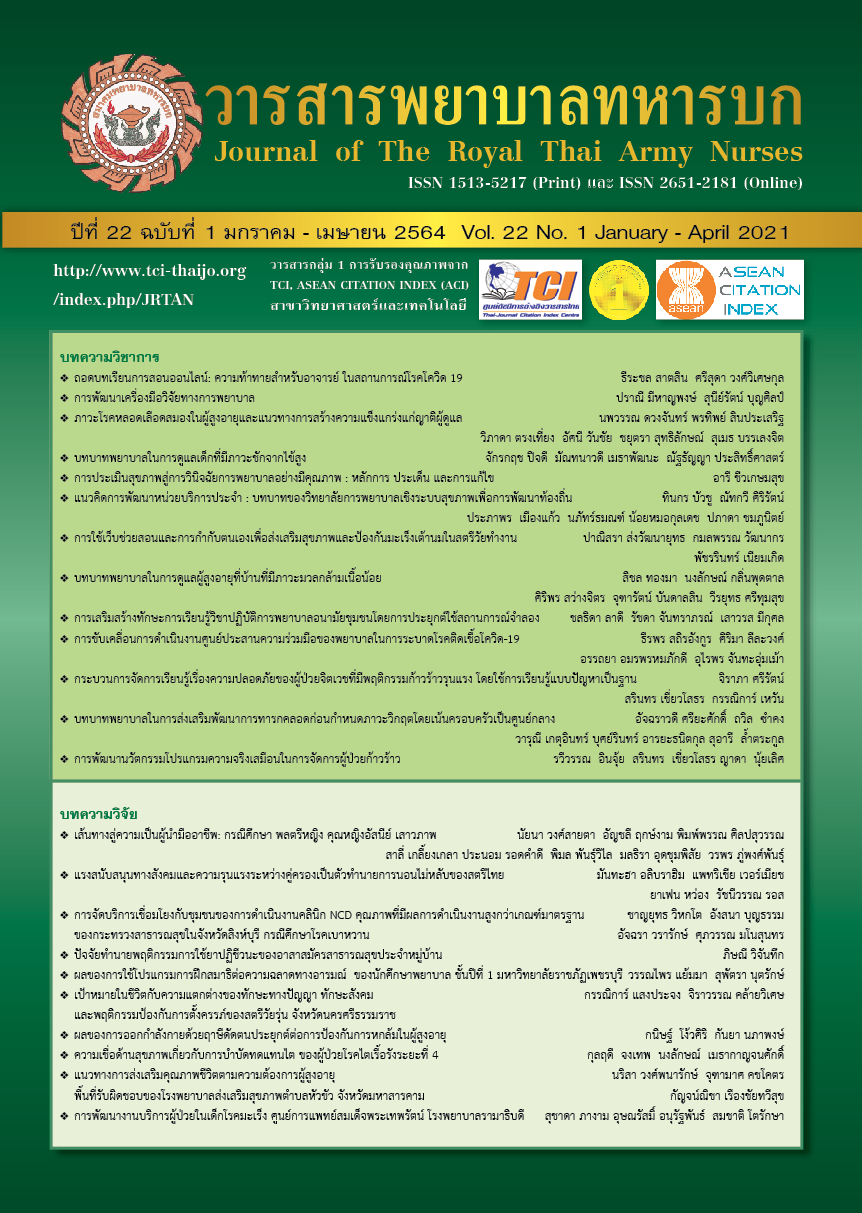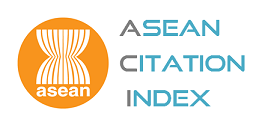ผลของโปรแกรมการเสริมสร้างพลังอำนาจต่อความรู้ ทัศนคติ และการปรับพฤติกรรมการบริโภคอาหารที่เสี่ยงต่อการเกิดโรคมะเร็งท่อน้ำดี
คำสำคัญ:
การเสริมสร้างพลังอำนาจ, ความรู้, ทัศนคติ, การปรับพฤติกรรมการบริโภคอาหารบทคัดย่อ
การศึกษาวิจัยกึ่งทดลองเพื่อศึกษาผลของโปรแกรมการเสริมสร้างพลังอำนาจต่อความรู้ ทัศนคติ และการปรับพฤติกรรม การบริโภคอาหารที่เสี่ยงต่อการเกิดโรคมะเร็งท่อน้ำดี ใช้กรอบแนวคิดทฤษฎีการปรับตัวของรอย และแนวคิดการเสริมสร้างพลัง อำนาจของกิบสัน กลุ่มตัวอย่าง คือ ประชาชนกลุ่มเสี่ยงต่อการเกิดโรคมะเร็งท่อน้ำดี จำนวน 40 ราย แบ่งเป็นกลุ่มควบคุมและ กลุ่มทดลอง กลุ่มละ 20 คน กลุ่มทดลองได้รับกิจกรรมเสริมสร้างพลังอำนาจ คนละ 45-60 นาที/ครั้ง ติดต่อกัน 6-8 วัน เครื่องมือ ที่ใช้ในการศึกษาวิจัยคือ โปรแกรมการเสริมสร้างพลังอำนาจ มี 5 กิจกรรม เก็บรวบรวมข้อมูลโดยใช้แบบประเมินความรู้ ทัศนคติ และการปรับพฤติกรรมการบริโภคอาหาร วิเคราะห์ข้อมูลด้วยสถิติ Independent t-test และ Paired t-test ผลพบว่า (1) ประชาชน กลุ่มเสี่ยงต่อการเกิดโรคมะเร็งท่อน้ำดีที่ได้รับการเสริมสร้างพลังอำนาจ มีค่าเฉลี่ยคะแนนความรู้ ทัศนคติ และการปรับพฤติกรรม การบริโภคอาหารสูงกว่าประชาชนกลุ่มเสี่ยงต่อการเกิดโรคมะเร็งท่อน้ำดีที่ไม่ได้รับการเสริมสร้างพลังอำนาจ อย่างมีนัยสำคัญ ทางสถิติที่ระดับ .01 (2) ประชาชนกลุ่มเสี่ยงต่อการเกิดโรคมะเร็งท่อน้ำดีภายหลังได้รับการเสริมสร้างพลังอำนาจมีค่าเฉลี่ยคะแนน ความรู้ ทัศนคติ และการปรับพฤติกรรมการบริโภคอาหารสูงกว่าก่อนการได้รับการเสริมสร้างพลังอำนาจ อย่างมีนัยสำคัญทางสถิติ ที่ระดับ .01 แสดงให้เห็นว่าการเสริมสร้างพลังอำนาจ ช่วยส่งเสริมและเพิ่มความรู้ ทัศนคติ และปรับพฤติกรรมการบริโภคอาหารที่ เสี่ยงต่อการเกิดโรคมะเร็งท่อน้ำดีของประชาชนได้
Downloads
เอกสารอ้างอิง
The Task Force of Health data and Information, Bureau of Policy and Strategy. Number and mortality rate per 100,000 population based on of the first 10 causes of death group (according to International Statistical Classification of Diseases: 10th Edition) 2016-2018. Thailand: Bureau of Policy and Strategy; 2019. (in Thai)
Cancer Registry Unit, Sapphasitthiprasong Hospital. Statistics of cancer patients admitted in the years 2013-2014. Ubon Ratchathani: Sapphasitthiprasong Hospital; 2019. (in Thai)
Khuntikeo N, Pugkhem A. Current Treatment of Cholangiocarcinoma. Srinagarind Med J 2012; 27(3): 340-50. (in Thai)
Sripa B, Yongvanit P, Pairojkul C. Etiology and Pathogenesis of Cholangiocarcinoma : Introduction to the Association with Liver Fluke Infection. Srinagarind Medical Jurnal 2548. 20(3): 22-134. (in Thai)
Pamulila S, Bumpenchit S. Care system for patients with cholangiocarcinoma. Journal of Nursing Science and Health. 2017; 40(3): 83-95. (in Thai)
Khuntikeo N, Yongvanit P. Conceptual framework of health policy and strategies to administer and manage cholangiocarcinoma systematically and effectively. Srinagarind Med J 2012; 27(suppl): 422-26. (in Thai)
Khon Kaen University, National Health Security Office and Ministry of Public Health. Strategies to reduce liver fluke and eliminate cholangiocarcinoma of Isan people. Khon Kaen: Faculty of Medicine, Khon Kaen University. 2012. (in Thai)
Poomsanguan, K. Health Empowerment: Nurses’ Important Role. Journal of The Royal Thai Army Nurses 2014; 15(3):86-90. (in Thai)
Viriyavipart C, Thaewnongiew K, Klangburum. Knowledge, perception and behavior about flood consumption related to the prevention of Opisthorchiasis among people in Upper Northeastern Thailand in 2013. Disease Control Journal 2015; 41(1): 77-86. (in Thai)
Tamngam P, Pamulila S, Sarakum N and Inpang S,.Knowledge, Attitude, and Consumption Behavior Associated with Cholangiocarcinoma in a Sub-District, Warinchamrab District, Ubon Ratchathani Province. Journal of Nursing Science and Health. 2019; 21(3). (in Thai)
Pamulila S, Limumnoilap S. Effect of Empowerment on Self-Concept Adaptation in Liver Cancer Patients. Journal of Nursing Science and Health 2007; 30(3): 1-9. (in Thai)
Roy C, Andrews A. The Roy Adaptation Model. 2nded. Stamford: Appleton & Lange; 1999.
Gibson H, (1995). Nursing: Empowerment and the problem of power. Journal of Advanced Nursing 1995, 21(5): 865-871.
Juntachum, W. Nursing research, sample selection and sample size determination. Khon Kaen: Department of Nursing Education, Research and Administration, Faculty of Nursing, Khon Kaen University. 2002. (in Thai)
Kanedtapilux J, Khampolsiri T, Pothiban L. The Effect of an Empowerment Program on Quality of Life Among Older Persons with Stroke. Nursing Journal 2020; 47(1): 222-30. (in Thai)
Phuakpong K, Bunthumporn N, Somprasert C. The Effects of An Empowerment Program on The Self-Control of Amphetamine Use Disorder Patients. Journal of The Royal Thai Army Nurses 2018; 19(suppl.):118-28. (in Thai)
Sasang N, Pensirinapa N, Prasertchai A. Empowerment and Organization Commitment of Professional Nurses in Thammasat University Hospital. Journal of The Royal Thai Army Nurses 2016; 19(1):79-187. (in Thai)
ดาวน์โหลด
เผยแพร่แล้ว
รูปแบบการอ้างอิง
ฉบับ
ประเภทบทความ
สัญญาอนุญาต
บทความหรือข้อคิดเห็นใดใดที่ปรากฏในวารสารพยาบาลทหารบกเป็นวรรณกรรมของผู้เขียน ซึ่งบรรณาธิการหรือสมาคมพยาบาลทหารบก ไม่จำเป็นต้องเห็นด้วย
บทความที่ได้รับการตีพิมพ์เป็นลิขสิทธิ์ของวารสารพยาบาลทหารบก
The ideas and opinions expressed in the Journal of The Royal Thai Army Nurses are those of the authors and not necessarily those
of the editor or Royal Thai Army Nurses Association.







